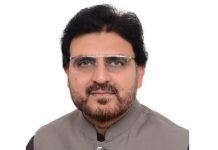Abdullah Gul
Pakistan was pushed into the inferno of war on terror by the imperialist USA after 9/11 with ill-intentions. While roots of terrorism were identified in Afghanistan, the war was surreptitiously diverted into FATA, and then into other parts of Pakistan. All this time debate kept raging among Pakistanis whether it was US war or ours. Irrespective of this debate, the fact is that law enforcing agencies have been fighting the menace with all their strength and energy under the ‘do more’ mantra, but despite their best efforts, terrorism could not be bottled. Today, terrorism is found in every nook and corner of the country and no one is safe. While Pakistan fought the war on terror diligently and sacrificed the most, it was mistrusted, ridiculed and punished the most by the one that imposed this war upon Pakistan. The ISAF has returned home but has left behind festering cancer of terrorism unhealed.
Although it became our war after drone attack in Bajaur in October 2006 killing 82 students of a seminary and botched up Lal Masjid operation in July 2007 resulting in accelerated spate of suicide attacks followed by group attacks, however, we kept playing with the theme of good and bad Taliban and remained tied to peace deals with so-called friendly groups. PML-N regime supported by PTI and religious parties went out of the way to open dialogue with TTP and arrive at an amicable solution but their softness was replied with violence. Maj Gen Sanaullah Niazi was martyred and Khurasani’s men played football with cut off heads of 23 captive soldiers. Operation Zarb-e-Azb was launched on June 15, 2014 in the aftermath of terror attack on Jinnah Terminal to eliminate the last bastion of TTP in North Waziristan. However, it didn’t deter foreign paid terrorists. Whatever doubts that existed were removed after the ghastly attack on Peshawar APS School/College on 16 December 2014 in which 132 young students and teachers were brutally killed by terrorists.
In the wake of Peshawar tragedy and highly charged up emotions of the public and emotional sentiments expressed by people from all walks of life, the entire political and religious leadership approved the 20-point agenda of the government to fight and eliminate the scourge of terrorism. It is a comprehensive Action Plan and has all the germs of success provided it is implemented with complete sincerity and honesty of purpose. Gen Raheel Sharif was instrumental in bringing everyone including Imran Khan on one page and making the APC held on 17 December a complete success. They also were in agreement to set up military courts to meet the existential threat, but some remained gripped with fears that they may get hauled up. Lurking fears of the NRO cleansed MQM and PPP were assuaged by Nawaz Sharif by assuring that military courts would be directed against terrorists/criminals involved in killing and that cases will be forwarded by the government.
Gen Raheel made it clear that the military courts were not the demand of the Army but that of the nation to eliminate terrorism. Feeling assured, all voted to amend the constitution and introduce 21st Amendment. JUI (F) and JI had consented but abstained from voting at the last moment. Their plea was that religion had been tagged with terrorism. The Bill authorizing setting up of military courts and extending their jurisdiction to try terrorists was passed on 6th January by the joint session of the parliament and signed by the president on the following day. Other opponents of military courts are human rights groups and portion of legal fraternity. PTI could also be put in this category since its leaders have been expressing reservations and were absent from the Parliament on the voting day.
It must not be forgotten that the country is at war. Unfortunately, while the Army, paramilitary forces; PAF, ISI and MI are fighting the war on war footing, other organs of the State are taking things lightly and leading normal peacetime life. Political class is engaged in normal festivities and political battles. Moratorium on death sentences enforced in 2008 piled up the backlog of 8500 culprits. But for Peshawar incident, it would have still remained operative. Although the police has suffered a lot at the hands of terrorists, but there is little change in their working and has done little to improve its image among the public. The judiciary has been moving at a snail speed and not taken any measures to deal with extraordinary challenges.
Other factors which have come in the way of dispensing speedy justice are the threats hurled by the terrorists to intimidate the witnesses, investigating officers, prosecutors and judges. In Sindh, this practice of brandishing threats is in fashion but no effort has been made to provide protection to the witnesses, investigators, prosecutors and judges particularly in case of terror related cases. FATA is still governed by FCR and Jirga system and has not been brought in mainstream. In Balochistan, 95% of territory falls in ‘B’ Area, which is outside the jurisdiction of police. This anomaly persist despite the whole province is in the grip of insurgency. In Karachi, MQM reigns supreme and have its way. Judges of lower courts amenable to corruption obstructs ends of justice. Connectivity of the police with criminals and terrorists was established on numerous occasions. The police consider this unholy linkage as a lucrative business to earn easy and big money.
While the political leadership remains handicapped to deliver owing to political expediency and selective policy of reconciliation, it uses the police for extracurricular activities such as VIP duties, personal protection and personal errands. Political leaders are the biggest violators of law of the land. Considering themselves to be above law, they break and bend laws to suit their whims. They keep accountability in name only, want judiciary to remain subservient and parliament filled with rogues to reign supreme. They often clash with the military establishment for no rhyme or reason mainly because of self-perceived fears and keep cooking plots how to tame the GHQ and ISI. Politicians have been found patronizing criminal gangs and extremist groups to be able to twist the tails of their political opponents/detractors and to accomplish illegal errands. Some political parties are maintaining armed militant wings to achieve political ends and to earn money through extortion, kidnapping for ransom and other coercive tactics.
Religious leaders of different sects by virtue of their nuisance value also seek their pound of flesh from the government and their disciples. Peers and Faqirs, mostly fake, hold sway over the gullible people residing in the rural belt. Some of the Madrassahs play a negative role in brainwashing the youth. So-called independent media which have been contracted by foreign powers sing tunes of its foreign paymasters. It has been instrumental in polluting the moral turpitude of the society by promoting western/Indian liberalism, downplaying Islamic values, undermining premier institutions and glamorizing India.
Foreign funded NGOs stationed in all parts of the country are promoting foreign agenda. Those who had not accepted Pakistan, their numbers have multiplied over a period of time and they have married up with chronic quislings. These snakes in the grass keep stinging and shredding the foundations of Pakistan. They readily render their services to foreign agencies to undercut Pakistan which feeds and shelter them.
In the backdrop of contaminated environments, leadership crisis and insipid judiciary, religious extremism, intolerance, crime and terrorism thrived unchecked. Whenever things went out of control, the Army or Rangers were requisitioned in aid of civil power to stem the downslide and clear the mess. On each occasion, whether it was man-made or natural disaster, the Army performed its role assiduously and often went beyond its scope of responsibility to tide over the crisis.
Terrorism and lawlessness with which Pakistan is inflicted since 2003 are essentially the responsibility of the police backed by IB, FIA, CID and Special Police and not that of Army, ISI and MI. Currently, FATA, parts of Khyber Pakhtunkhwa (KP), Balochistan and Karachi are turbulent regions. While 170,000 Army troops and paramilitary forces are deployed in FATA and settled areas of KP to fight terrorism, the FC is in the forefront against foreign backed separatists in Balochistan. Sindh Rangers are leading the operation in Karachi against criminals and terrorists. Notwithstanding Herculean efforts put in by law enforcing agencies to defeat terrorism and crime, these evils have so far not been uprooted because of lack of cooperation of other organs of the State. Civil administration and judiciary remained out of step.
Former Chief Justice (CJ) Iftikhar had a golden opportunity to remove the fault-lines in the judicial system. The whole nation had come out on the streets when he was deposed by Gen Musharraf in March 2007. His defiance had made him a hero. Lawyers’ community and civil society fought for his release/re-instatement, independence of judiciary and rule of law and ultimately won the battle. Taking into account their wholehearted support, he owed it to the nation to revamp the judiciary, make it pro-poor and independent in real sense. He however wasted all his energies in few high-profile cases and in suo mottos and paid little attention to the messy lower judiciary and in removing lacunas in legal procedures/systems which prevented timely dispensation of justice. Over 5000 terrorists were captured by security forces within the battle zones of Swat and South Waziristan in 2009 and handed over to the police for trials. Not one was convicted and punished. Most were granted bail; and they rejoined their militant groups and started fighting with renewed revenge.
Fond of publicity, CJ eulogized the media and remained soft towards Baloch separatists and espoused the cause of missing persons in Balochistan. He derived pleasure in demeaning senior Army officers by asking them to appear in court in uniform and asking twisted questions as if they were involved in abductions. He didn’t realize that the FC, ISI and MI in Balochistan were not only acting as the frontline defence against foreign supported insurgents but were also carrying the burden of corrupt and inept police, provincial government and civil administration. We recall his knee jerk decision against a Rangers Sepoy who in the line of his duty shot an offender who menacingly tried to move closer to him despite his warnings. He was convicted and punished while the DG Rangers Sindh was sacked. In other words, instead of helping the law enforcers, he did his best to discredit and demoralize them. Iftikhar failed to nab/convict NRO beneficiaries despite having declared this black law invalid. He also failed to recover $60 million from Swiss Bank laundered by Zardari.
In the face of incompetence and lack of will of civil courts, military courts provide best answer to deal with the existential threat. These will remain operative for two years, which is good enough time to overcome shortfalls of the criminal legal system. With regard to the criticism of the critiques, it will be sufficient to say that had the judiciary been delivering, there would not have been any need for military courts.
In nutshell, it must be remembered that weak and prejudiced system of justice gives rise to religious extremism, fanaticism and terrorism. While the have-nots have remained deprived of cheap and speedy justice, our criminal judicial system has failed to act as a deterrent for the terrorists. Glaring loopholes in the system have allowed the terrorists to escape justice. It is possible that establishment of military courts might act as a stimulus for the judiciary to reform itself and come up to the expectations of all segments of the society.
The writer is Director General of an independent think tank (Measac) and also Chairman of All Youth Organisations of Pakistan (Youth Movement Pakistan). He keeps on appearing on international and national televisions as Defense and Political Analyst.











